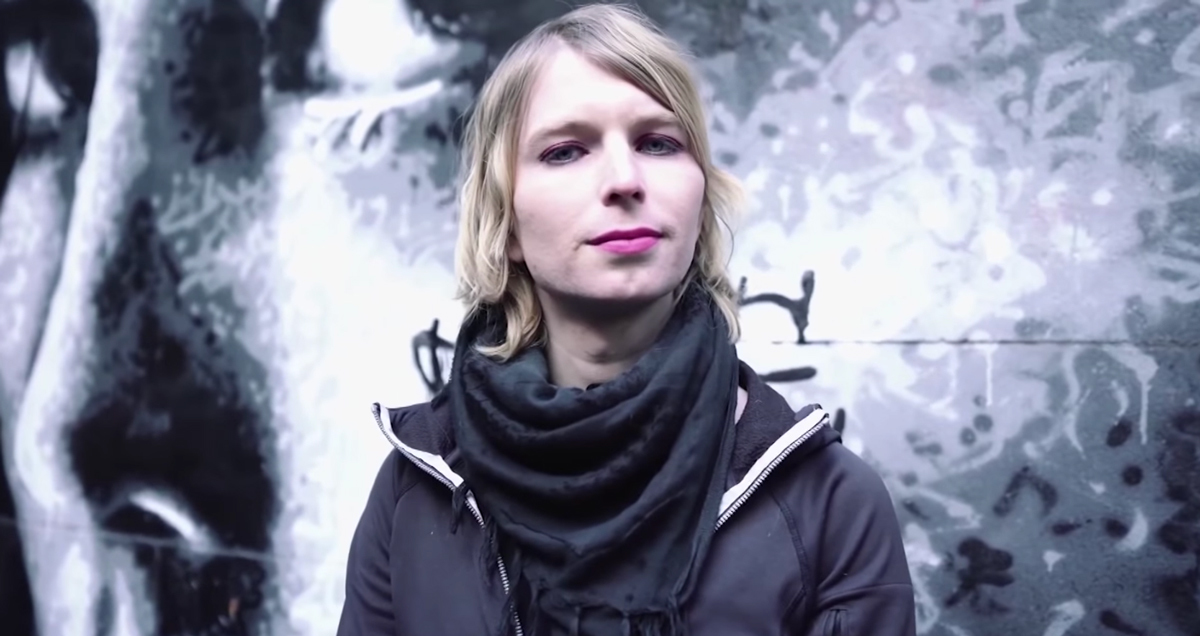
On the one-year anniversary of her release from prison, Chelsea Manning wants the world to know that she means business. After spending seven years in prison for passing sensitive government documents to Wikileaks, Manning is seeking to run for the U.S. Senate in Maryland. Originally sentenced to 35 years, her sentence was commuted by President Barack Obama to time served and she was released in May 2017.
While in prison, Manning came out as transgender, though she’s not the first (even in Maryland) to challenge a sitting member of Congress. Retired Navy SEAL Kristen Beck attempted to unseat U.S. Rep. Steny Hoyer in 2016, but only got 12 percent of the vote.
Manning, who officially filed on January 11, will be challenging two-term Democrat Senator Ben Cardin, who is up for reelection in November. (Cardin’s spokesperson told Baltimore that the Senator “is looking forward to a vigorous discussion of the issues and a robust conversation with Maryland voters.”) We got a chance to talk with Manning about her time in prison, her political platform, and what she thinks of her critics.
You’re originally from Oklahoma. Why did you choose to run in Maryland?
I’ve been a resident of Maryland since 2006. I moved here after living homeless in Chicago for several months. I went to Montgomery College and I lived here for a few years before I enlisted in the military. Even when I was in the military, I was always coming back home to Maryland. My aunt lives here—I have roots here.
What inspired you to get into politics?
This time last year, I was still in prison. When I was released, I had this notion that I’m going to go home, retire, and live this quiet, comfortable life. And I get outside and the world is such a very strange and different place. Being out and about made me recognize just how important it is for us to combat the forces of political repression and oppression that many people all over the country—not just in Maryland or Baltimore—face every day.
It’s been getting progressively worse. I’ve said this enough times, but I came outside and it seemed like a dystopian novel, like the world that I just entered into is just the most boring dystopian novel I’ve ever read.
You are going up against two-term Senator Ben Cardin. What do you plan to do differently?
I voted for him twice. What makes me different is I’m trying to present issues that are important. It’s not about him—it’s more about the establishment, regardless if they are left or right. We have a lot of these nameless, faceless career politicians who are not dealing with the issues in our communities that we’re worried about. We live in this domestic population where the criminal justice system, our police system, our surveillance state have taken over our entire lives. Many of us now live in fear.
What current issues are you passionate about?
We need to roll back a lot of those federal bureau prisons. It’s become a very militarized force. We have police and we have these massive prisons and instead of defending these systems, we have to start rolling it back, releasing prisoners, start sending people home, and we need to end this. We have the largest incarcerated population in the world and that should give us thought.
What about healthcare and immigration? Those are hot topics right now.
I believe that every single person that needs healthcare should be given access to healthcare that is free, that is unconditional, and that is private. The Affordable Care Act was a handout to insurance companies and a Band-Aid to a much deeper problem in our healthcare system—it didn’t go far enough. I support a single-payer healthcare system, how that gets implemented is up for debate. I certainly believe that the end result should be free.
I also believe that people have an absolute right to come into this country. The immigration system is being used today to go after minority groups. The immigration systems have been weaponized against minority communities in our country and we need to roll back on that and we need to stop.
Tell me about your campaign slogan, #WeGotThis.
It’s a personal mantra of mine. Whenever things looked hopeless [in prison] and we had no evidence that we were going to get through this, I would say “we got this,” and I would repeat this to myself and the people around me. Even when we could see the light at the end of the tunnel, it was important to remember that doesn’t mean the end of the tunnel isn’t there. “We got this” is an embodiment of that. I started saying it on Twitter without even realizing it and it morphed into a hashtag over the last several months.
What do you have to say, if anything, to the critics who say you shouldn’t be trusted and think that your past deems you unfit for the job?
My team is going to have a chance to show ourselves, we’re going to have a chance to make this campaign work and we are going to be able to address these things. The haters are going to hate no matter what, we’re going to face criticism, and deal with conspiracy theories. The pundits are often wrong, they’ll give their two cents, but pundits don’t make policies and they don’t determine how the country is run. So we’ll see what happens. We got this.
